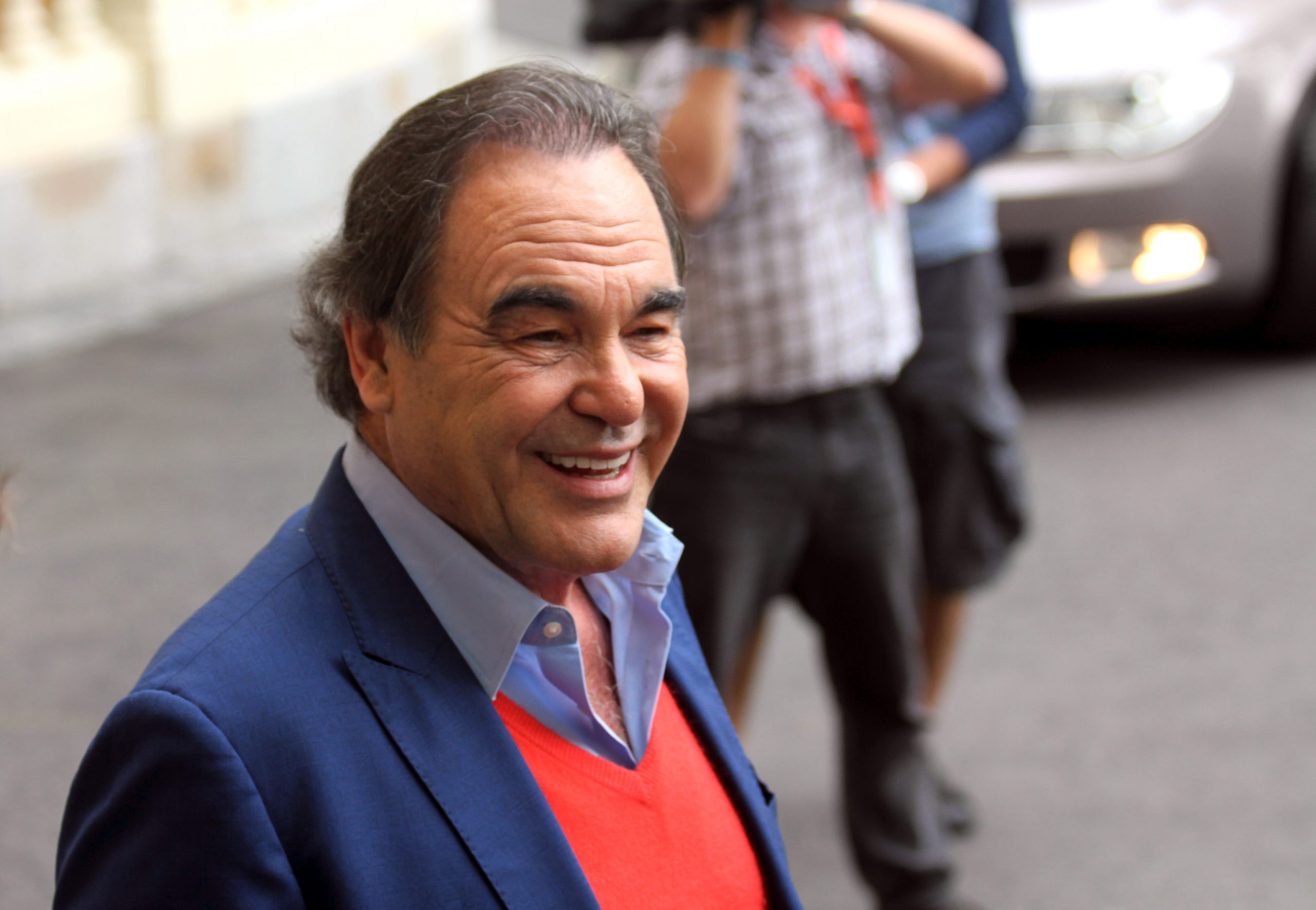Oliver Stone, America Firster

I first became aware of Oliver Stone when in 1986 I was watching his film Salvador with an audience of left-wing Santa Barbarians. They were enjoying this madcap cinematic indictment of Uncle Sam’s imperialist crimes in Central America—until a scene in which the rebel forces, riding to town like a Marxist cavalry in the righteous cause of The People, began executing the unenlightened. Then the boos rang down.
Who is this guy, I wondered. My curiosity was whetted further when the P.C. reviewer in the Los Angeles Herald denounced Stone’s screenplays for earlier films: “Movies like Midnight Express, Scarface, and Year of the Dragon are such grand-scale xenophobic fever-dreams that they almost demand to be remade into operas, complete with belching smoke and lurid lighting and crimson-suited devils scurrying out of the wings to pitchfork lily-white Mother America.”
Ah, a left-wing America Firster!
Not quite, as his subsequent work and his entertaining new memoir, Chasing the Light, illumine, but Oliver Stone, our most political major filmmaker, evinces a rowdily heterodox vision shaped by the unusual quartet of Jim Morrison, Sam Peckinpah, Frank Capra, and Jean-Luc Godard.
What do you call a man who joins the Merchant Marine on a whim, runs up big pro football gambling debts, and takes the Old Right view of FDR’s foreknowledge of the Japanese attack on Pearl Harbor?
I’d call him an American.
Stone was a rich kid, the son of an FDR-hating Jewish Republican who had served on Eisenhower’s Supreme Headquarters Allied Expeditionary Force staff and a French Catholic party girl. He attended the Hill School, played on the tennis team, was devastated by his parents’ divorce, and then went seriously off script.
Avid for experiences, Stone dropped out of Yale, taught in a Catholic school in Taiwan, and volunteered to fight in Vietnam. He came home with a Bronze Star, shrapnel in his ass, and a taste for “powerful Vietnamese weed.”
Stone’s politics hadn’t changed all that much, though. He had supported Barry Goldwater in 1964 and would vote for Ronald Reagan in 1980. In later years he became more explicitly libertarian, expressing support for Ron Paul and making a film about Edward Snowden.
At root, Oliver Stone is a patriot who despises the American Empire for corrupting his country. JFK, his fantasia on the Deep State, echoes Dwight Eisenhower’s warning that “we must guard against the acquisition of unwarranted influence” by “the military-industrial complex.” Platoon and Salvador bespeak an old-fangled American anti-interventionism in an age when that tendency, once the default position of ordinary Americans, is a virtual thoughtcrime.
Lost innocence is as common in Stone’s films as splattered blood. In Midnight Express, the Turkish prison movie to end all Turkish prison movies, protagonist Billy Hayes is a Long Island college kid just trying to make a few bucks by smuggling two kilos of hashish to sell to his friends. Heck, it’s no different than being the guy who runs out to pick up the pizza and beer at halftime! (The real Hayes, as Stone later learned, was on his fourth smuggling run and was about as innocent as Brad Davis, the deeply troubled actor who played him.)
When his sentence is stretched from four to 30 years, Billy explodes in a Stone-penned courtroom rant that belongs in the xenophobe’s hall of fame: “For a nation of pigs it sure is funny you don’t eat ’em … I hate you, I hate your nation, and I hate your people.”
Yikes! As the husband of an Armenian I’m not overly sensitive to slights against the Turkish nation, but this was a tad intemperate. But so was the left-wing French newspaper Liberation, which reviled Stone as “a madman of the Right.”
 A pithier America First line from Stone’s pen came in Year of the Dragon (1985), when a New York City cop (Mickey Rourke) responds to a Chinese gangster who is describing his culture’s ancient tolerance of gambling and extortion: “This is America you’re living in and it’s 200 years old, so you’d better get your clocks fixed.”
A pithier America First line from Stone’s pen came in Year of the Dragon (1985), when a New York City cop (Mickey Rourke) responds to a Chinese gangster who is describing his culture’s ancient tolerance of gambling and extortion: “This is America you’re living in and it’s 200 years old, so you’d better get your clocks fixed.”
Stone’s co-writer on Year of the Dragon was Michael Cimino, whose Oscar-winning epic The Deer Hunter was unusual for its sympathetic treatment of small-town working-class men whose church is central to their lives. Critic Pauline Kael sneered at The Deer Hunter’s “traditional isolationist message: Asia should be left to the Asians, and we should stay where we belong, but if we have to be over there we’ll show how tough we are.” A Trumpian message, on Trump’s better days. Cimino blew up his career with the sprawling Heaven’s Gate, a commercial disaster that snuffed his long-dreamt-of goal of filming Ayn Rand’s novels The Fountainhead and Atlas Shrugged.
Liberal Hollywood, eh?
Bill Kauffman is the author of 11 books, among them Dispatches from the Muckdog Gazette and Ain’t My America.